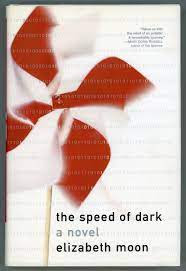Last week I finished an awesome book I highly recommend.
It's a fascinating story told from the perspective of an adult with autism. It was published in 2002, and is set in the "near-future" - so, sort of sci-fi? - although the setting is very normal, modern, USA. With one exception: no one is born autistic anymore. Our narrator (primary narrator, others pick up the tale in some scenes) is a grown adult, born before the miracle cure was created.
Wait... futuristic medicine... Yes, I guess this qualifies as sci-fi. It just doesn't read like sci-fi.
It reads like a story about a man who is considered disabled, works in a job with other "autists" (word from the book) in a department of a large corporation where specific tasks are suited to these rare abilities. He deals with bias from his boss, misunderstandings from some "normal" friends, but treated as a normal friend by others.
I love the way the author got into some specifics of difficulties he has. He has to talk to the police at one point, and one of the officers doesn't understand why he gets tongue-tied, but we as the reader are in his head, hearing why the frustration prevents words from coming. It's impossible not to feel empathy and compassion, and to want to do better in my own life.
I won't give away any plot points, because I highly recommend this to anyone. Especially anyone who touches on the autistic world from the outside. I have a niece and a nephew on the spectrum, so I want to know more, but I don't deal with it on a daily basis.
⭐⭐⭐⭐⭐

I think the term sci-fi is used pretty loosely. The Handmaid's Tale is considered sci-fi and there is nothing technologically advanced about it. However, because it is in a dystopian future like 1984 and Brave New World. It is considered sci-fiction.
ReplyDeleteI still disagree. But no one asked me.
Except for the medical reasons for women having fewer children, I agree. Not a lot of science involved.
DeleteI've read some stuff by her. The books I read I enjoyed. But it's been a while.
ReplyDeleteThe more I look into it, the more I'm convinced I'm on the spectrum. At the very least, I'm neurodivergent. That's part of the reason why I don't know if I could suspend my disbelief to get through this book. As a child, I was not considered "disabled" in any sort of way. The autism spectrum encompasses a lot of variety.
I have decided (IMHO) that even the term "autism spectrum" is misleading. Surely there is a broader "mentality/cognition spectrum" that EVERYONE is on. At first I visualized this as a bell-curve with the so-called normals at the peak. But then I realized if you see it as more of a 3-D dome, we can include the people whose cognition includes some of the ethereal things - perceiving auras, "hearing" the universe. Again, the "normals" would be at the top of the dome, with fewer people of all kinds of divergent thinking in the lower, outlying areas.
DeleteI'm convinced this is more true. Because we are all alike and different.
Of late there is so much more awareness about ASD than many years ago. But people on the spectrum do have a hard time. I will check this book out.
ReplyDeleteI hope you enjoy it!
Delete